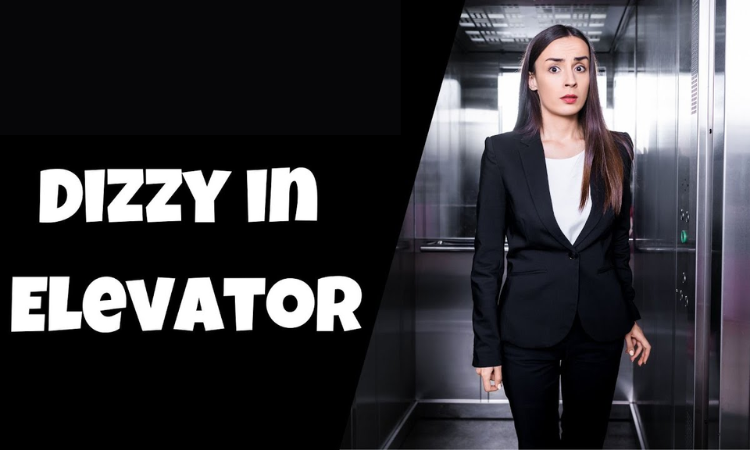When riding an elevator, have you ever felt dizzy afterward? That feeling is shared by many others, not just you. This is a common experience, especially in fast elevators or for those with weaker senses of balance.
Getting dizzy in an elevator could be the result of several different circumstances. One reason could be that your body isn’t used to the way elevators move. In an elevator, your body thinks you’re moving horizontally even if you’re actually moving vertically. As a result of this discrepancy in data, your equilibrium system may become disoriented, leaving you dizzy and weak.
The fact that elevators are typically enclosed spaces is another element that could contribute to dizziness. This could cause claustrophobia, which in turn could make you feel lightheaded. Finally, vertigo can be brought on by occasionally riding in an elevator that is jerky or uneven.
How to Prevent Elevator Dizziness?
Elevator vertigo can be prevented by taking the following measures:
- Stand with your back to the elevator door. This will reduce the disruption to your sense of balance and make it simpler for you to detect the elevator’s movement.
- Concentrate your sight on a single thing. Such a spot could be on the ground or a wall. Focusing on one point will help stabilize your balance system.
- Deep breaths are in order. Deep breathing can help alleviate dizziness and settle nerves.
- Don’t ride the elevator if you’re feeling overworked or anxious. The probability of feeling dizzy increases with both stress and weariness.
If you do feel dizzy in an elevator
If dizziness strikes in the elevator, rest by sitting down and closing your eyes. This will reduce tension between your visual and vestibular systems. You might also try meditating or focusing on your breathing.
If your dizziness is severe or does not subside after a few minutes, you should leave the elevator and go outside.
Other causes of elevator dizziness
In a number of situations, a fundamental health issue like:
- Disorders of the inner ear: The inner ear is responsible for both hearing and equilibrium. Inner ear problems are a common cause of vertigo, especially in confined spaces.
- Migraine: Migraine is a neurological disorder that can cause a variety of unpleasant symptoms, including dizziness, headache, and nausea.
- Medications: Some medications, such as antihistamines and antidepressants, can cause dizziness as a side effect.
If you have frequent or severe elevator dizziness, it is important to see a doctor to rule out any underlying medical issues.
Vertigo and Dizziness: What’s the Difference?
Before investigating elevator-related dizziness, it’s necessary to distinguish between vertigo and ordinary dizziness. These words are often used interchangeably, although they actually refer to different experiences. The spinning sensation that characterizes vertigo distinguishes it from simple dizziness, which is characterized by a lack of equilibrium. Elevator issues can cause either of these reactions, so it’s helpful to know what they mean.

The Roots of That Dizzy Feeling in the Lift
A. Motion Sickness Caused by Moving Systems That Start and Stop Often
Dizziness in elevators is often brought on by motion sickness. The abrupt motion of elevators can disrupt equilibrium, leading to dizziness and nausea. Here, we’ll discuss what causes motion sickness and how to avoid being sick in the first place.
B. Mental Fatigue
It’s not uncommon for elevators in places like packed office buildings or shopping centers to feel like a maze. When your brain is trying to process an excessive amount of information, you may experience dizziness as a side effect. How to prevent mental overload in crowded elevators will be discussed.
C. Inner ear disorders
Problems with the inner ear, which plays a critical role in maintaining balance, might lead to vertigo in an elevator. The most common causes of this pain are disorders in the inner ear, and we’ll discuss those as well as some possible solutions.
D. Anxiety and Stress
Many individuals really worry about being sick in an elevator, and this is especially true under stressful conditions. Techniques for reducing stress and anxiety before, during, and after an elevator ride will be discussed.
E. Problems with Blood Pressure
Blood pressure might fluctuate when riding elevators, contributing to dizziness. We’ll discuss the correlation between hypertension and elevator issues, as well as potential remedies.
Avoiding Dizziness in an Elevator
A. Taking long, leisurely breaths
Breathing exercises are one of the simplest and most efficient techniques to combat the dizziness that can occur in an elevator. We’ll show you how to slow your breathing and keep from freaking out.
B. Closing Your Eyes or Fixating Your Attention On Something Unmoving
In an elevator, visual stimuli might cause dizziness. Learn the benefits of closing your eyes or focussing on a fixed object to alleviate this unease.
C. Exiting the elevator and gingerly regaining your footing
Moving from a stationary floor to a moving elevator might throw off your equilibrium. We’ll go over strategies for coping with the transition and reducing dizziness.
D. Don’t take an elevator after drinking, smoking, or consuming caffeine.
Some drugs can amplify the dizziness caused by riding an elevator. Consider the effects of caffeine, alcohol, and nicotine on your ability to ride an elevator safely.
E. Practice stress-reduction methods like meditation or mindfulness.
Using relaxation techniques prior to boarding an elevator has been shown to significantly reduce feelings of nausea and dizziness. Practices like meditation and mindfulness can help you lead a happier, healthier life.
F. Confessing a Fear of Close Quarters (Claustrophobia)
Elevator phobia is a common form of claustrophobia. We’ll discuss several strategies for confronting your fear of elevators head-on and minimizing its impact on your life.
G. If at all possible, take alternate routes
In rare cases, if taking the elevator may cause dizziness, taking the stairs or escalator instead might be preferable. We’ll analyze cases where doing so is not just feasible but also beneficial.
